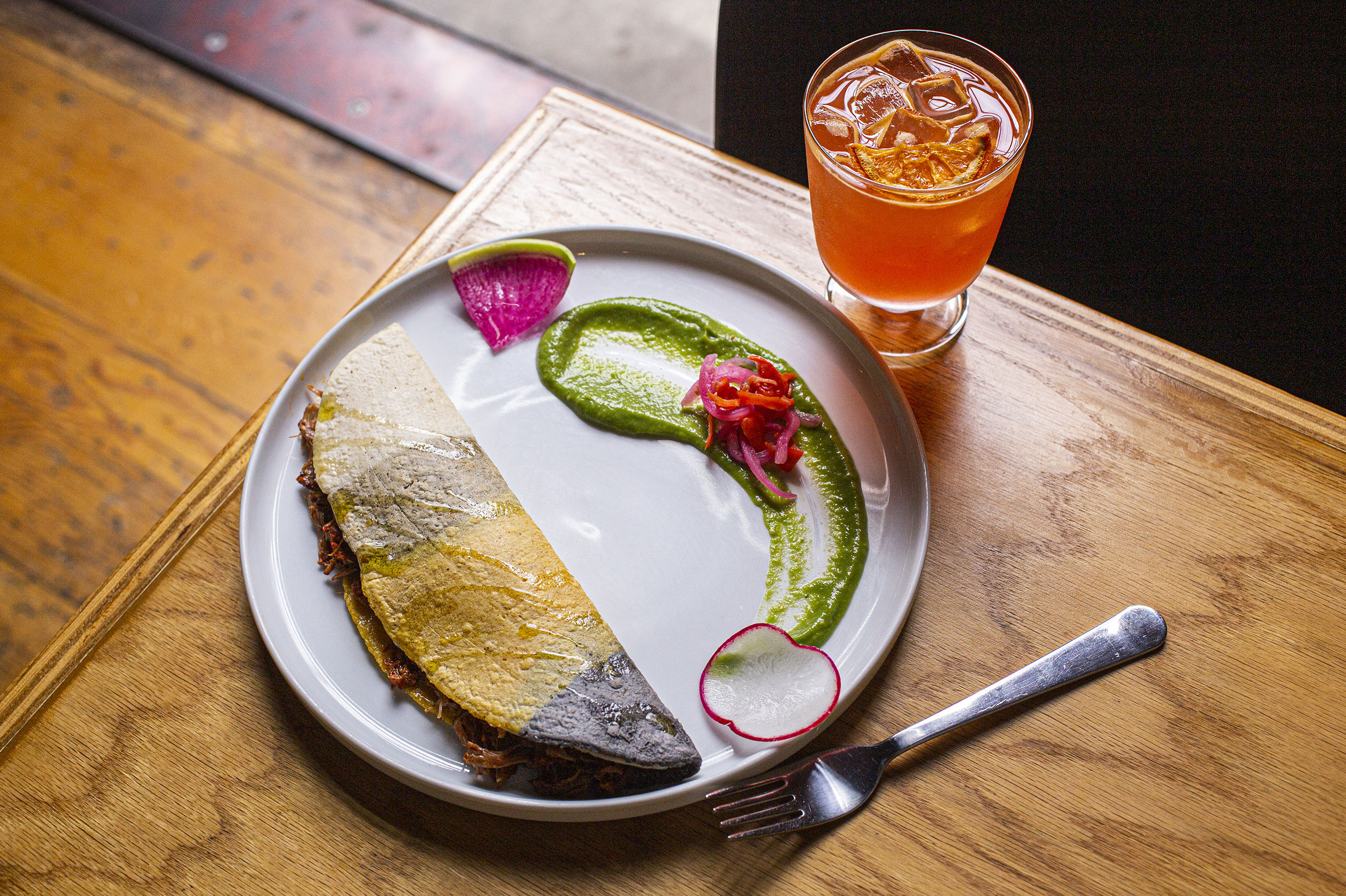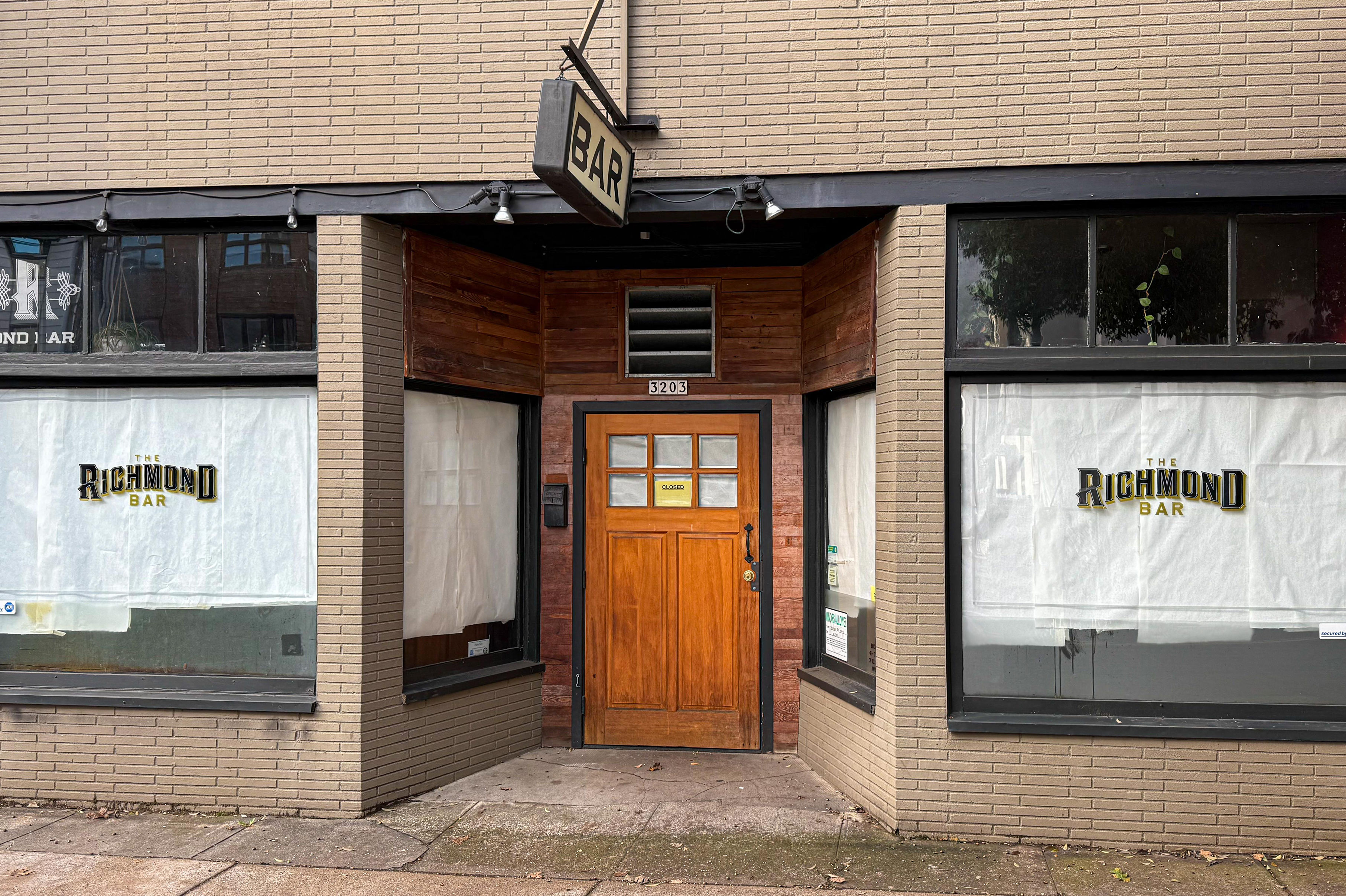The Last Days of Paley’s Place
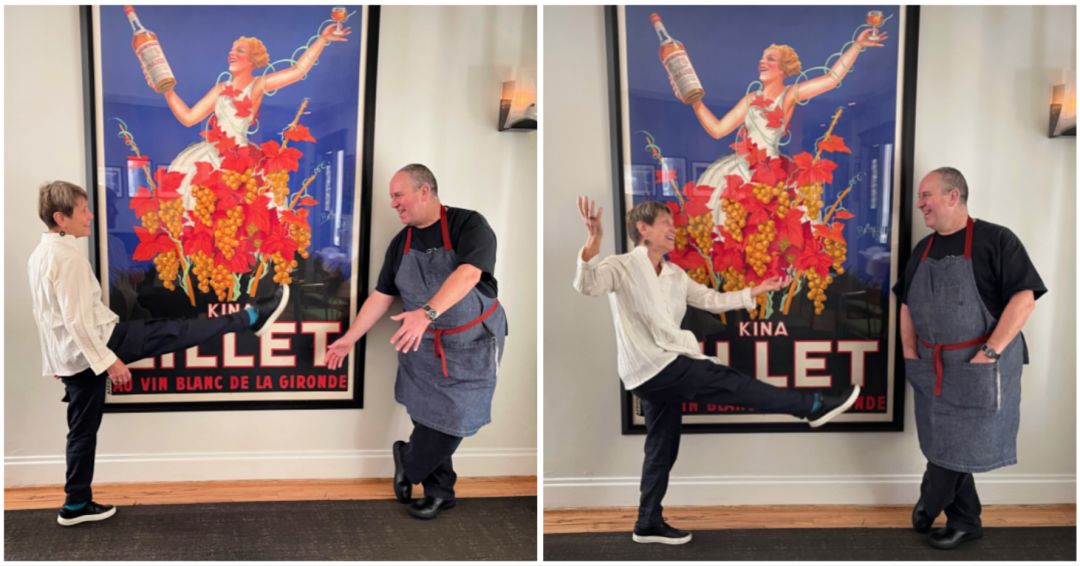
On a break from prepping one of their last dinners, Vitaly and Kimberly Paley, a former dancer, horse around in their iconic dining room.
Image: Karen Brooks
Paley’s Place was once as essential to Portland life as a latte or a trip to Powell’s. Soon it will be gone, a way of life with it. Not just a near spiritual connection to old-guard farmers and fisherman, but the utter graciousness, the conviction and intelligence, the old-world sense of standards.
But from now until the last diner eats the last bite on Nov. 27, Paley’s will be Paley’s, with all its good cheer and whimsy and punctilio. The menu still juggles old-school James Beard (Oregon coast razor clams), odes to France (escargot Bordelaise) and echt Portland—a monumental burger, which I once called “as beautiful as Angelina Jolie, but fatter.” The silverware is heavier than I remember. Or have arm muscles, now accustomed to plastic utensils, atrophied? Forks are still placed on the table with their tines pointing downward, a nod to an ancient French code and a signal to enemies: no weapons, no aggression during a meal.
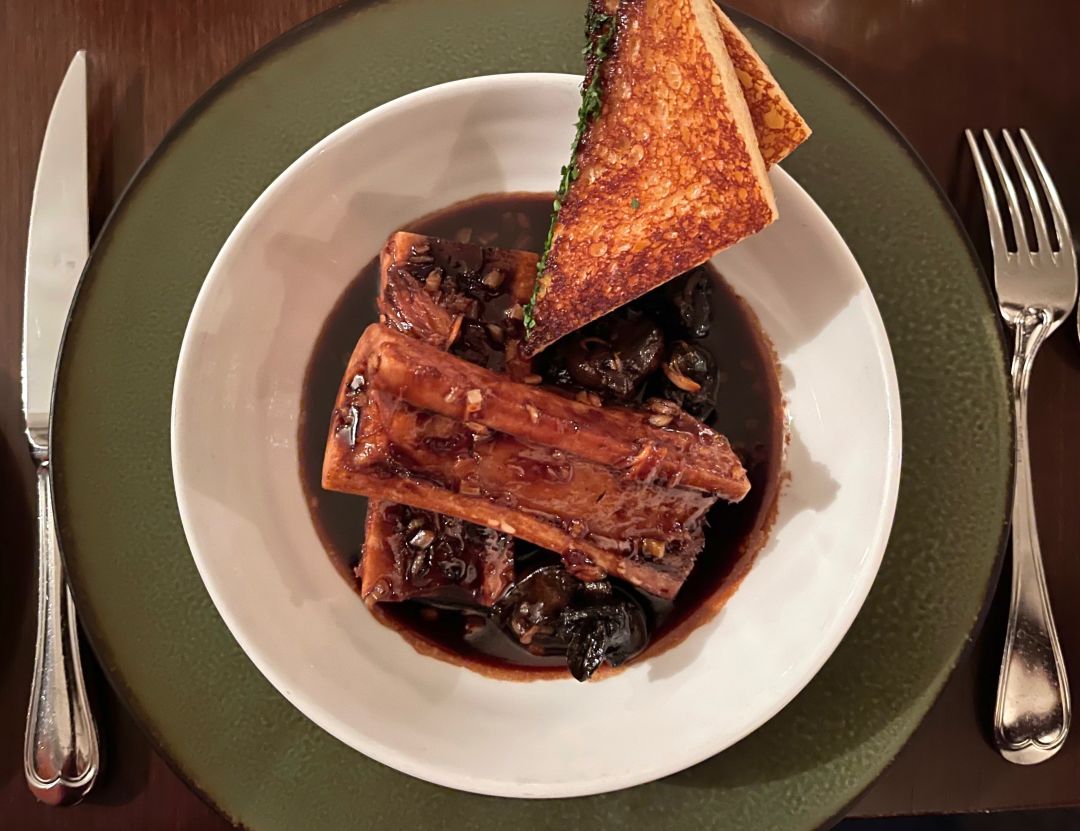
Escargot Bordelaise
Image: Karen Brooks
Kimberly and Vitaly Paley roam the tables, greeting customers as they did before spearheading downtown’s boutique hotel restaurant movement in 2012. Last year, after the pandemic stomped downtown like a hiking boot on a soufflé, the couple, who shuttered three spots and laid off hundreds of employees, returned full-time to where it all began and where it will end, Paley’s Place. Now, after 26 years and a James Beard award, one of the last pioneers of Portland’s farmer-connected food dream is calling it quits.
The story is best told in the large, framed black-and-white photographs hanging on the wall: intimate portraits of the famers who gave Portland’s food scene and Paley’s kitchen a purpose and a definition. Some have now departed for their journey in the sky; others are still making regular drop-offs.
I think about this while forking into a chicken potpie crowned in the art of French puff pastry, a highflier on the early menu. Inside, heady juices envelop a bird, bones and all, and a wealth of earthy chanterelles delivered earlier in the day by proto-Oregon forager Lars Norgren. I spot him in a photo on the wall, communing with the forest and more chipper than Nicolas Cage in Pig. Meanwhile, George’s Gathered Greens, a forever salad here, have been gathered, as always, by farmer George Wepler, who is still knee deep in it at age 82.
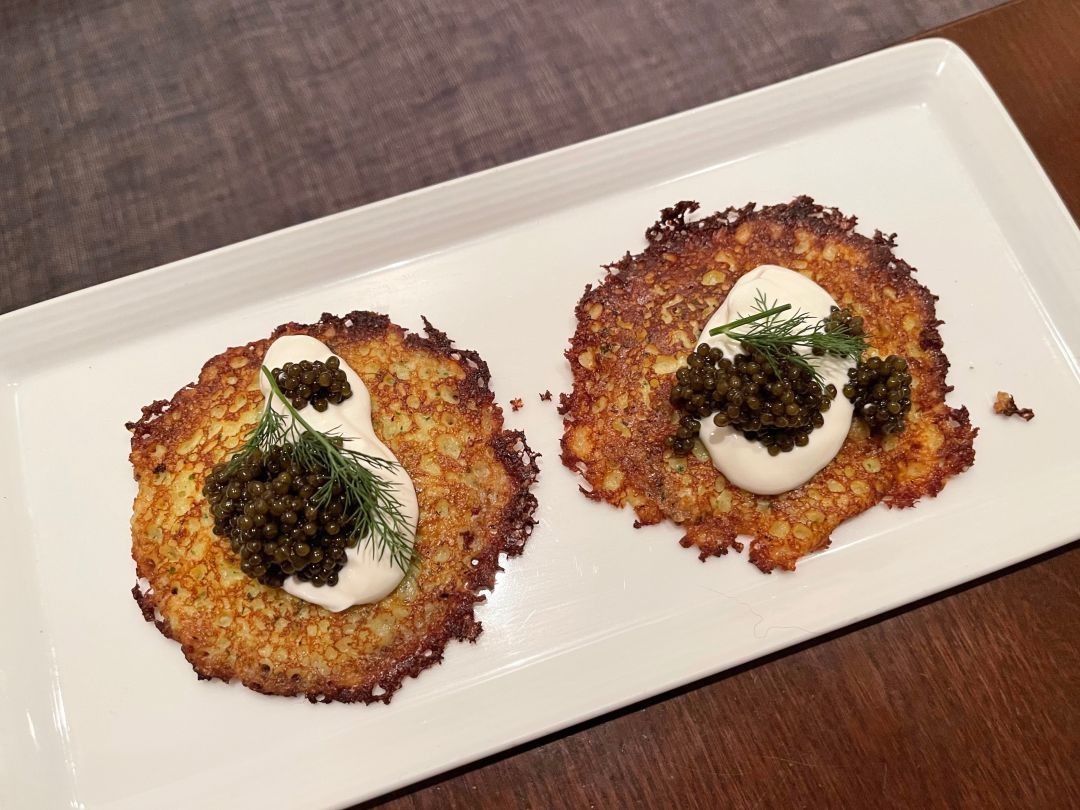
Potato pancakes from Paley's Place
Image: Karen Brooks
Potato pancakes are the high point of the evening, lavished in sour cream and caviar and delivered by Paley with the words, “My mom’s latkes.” Chekhov couldn’t conjure a more vivid version—full of crispy shreds and heart and history, sweet with potatoes fresh from the soil, and fried to a golden glory in Portland’s butter, duck fat. “Hire him for Hannukah,” bellows Roger Porter, my friend and former food critic rival. “Even God would bow down.”
More than perhaps even Paley’s own mom, I have been the no. 1 fan of Vitaly’s roots journey, his midlife plunge into his food—the Jewish table of Belarus, snuffed out by Soviet standardization and discrimination. Six years ago, the world he fled at 13 and pushed to the farthest recesses of his brain came alive—raw, emotionally, sumptuously—at his downtown pop-up Danet. Some of those dishes eventually migrated to Paley’s Place.
If this is my last taste, so be it. Like the Paleys, I’m going out on a high note.
When is the right time to go? According to Kimberly, you just know. Last fall, Imperial, Headwaters, and Rosa Rosa, the couple’s hotel restaurant trio, had to go. Between COVID worries, empty rooms, and the boarded-up-window apocalypse, downtown was toast. The sudden closures rocked them to the core.
Honestly? I never saw hotel restaurant kingpins on the Paleys' bingo card. Two poetic souls dealing with the grind of all-day hours and room service seemed like insanity. But Vitaly summed it up recently: “We loved the action, the adrenaline. I didn’t want to be a one-hit wonder. These places were outlets for new ideas and adventures. Paley’s could not be that.”
Back on NW 21st, they licked their wounds and deployed strategies to survive in a pandemic do-or-die world. But they reconnected with important things and found that happiness again, the spirit of Paley’s, with its loyal cooks and customers. On a recent Saturday night, everything was going right for a change. The reopened dining room was full of good noise and laughter. Kimberly was on a high, as she describes it. She waltzed into the kitchen and said, “Vito, my love. I want to serve Thanksgiving dinner, then close the restaurant.” To her surprise, he agreed.
“People think something terrible must have happened,” says Vitaly. “Nope. We wanted to go out on a high note, on our terms. It’s time.”
Why not? The restaurant earned a coveted spot on Gourmet magazine’s top 50 list in 2006. A year later, the New York Times called Paley’s Place “one of the top restaurants in the Northwest, if not the country.” In 2009, Vitaly won Cochon 555, a national pig contest, earning the title “prince of porc” (what every Jewish boy hopes for). Two years after that, he pinned an Iron Chef on the Food Network.
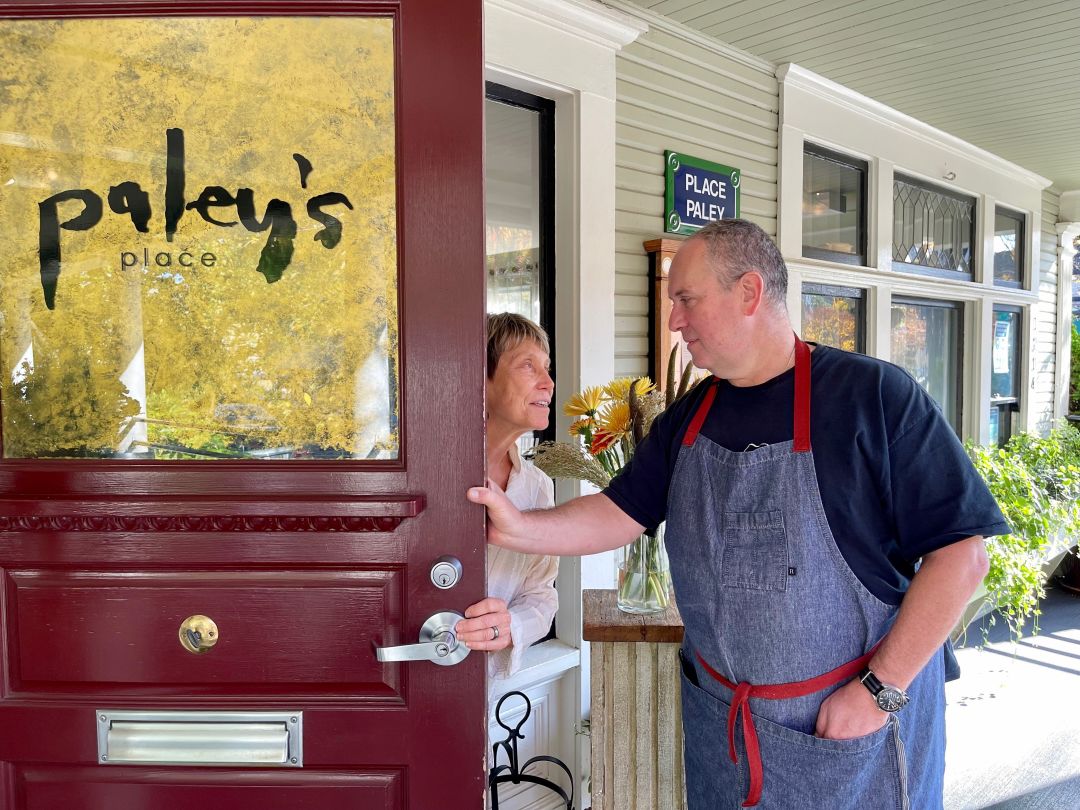
Kimberly and Vitaly Paley on their restaurant's front porch
Image: Karen Brooks
They survived recessions and the invasion of the DIY chefs. Their greatest accomplishment, says Vitaly, is working together. "We been through peaks and valleys that would take your breath away. We’ve been stubborn, persevered, maybe stupid. But we weathered all kinds of stuff, with one vision, one mind. I wouldn’t change a thing.”
Still, making Paley’s viable for another 20 years was not possible. “It’s a young person’s game,” says Vitaly, who is 58. Already, with rising food costs, little Paley touches—the amuse-bouche, the handmade chocolate with the bill, the bread basket—are gone. The couple was also clear: no fast-casual, no pizza for Paley’s. Adds Vitaly, “It’s time for another generation to set the direction.” The couple is leaving behind a food scene in the midst of change and uncertainty—but also an indelible legacy.
They arrived in 1994—the modern dancer (Kimberly) and prodigy classical pianist (Vitaly) who met in New York and chucked it all in for the Big Apple’s food world, with a detour to France, where they learned a philosophy: whatever you do, do it well. But rumors of an eccentric city with mythical produce became an obsession. They bought a one-way ticket to Portland with no plan B, then merged art and life in an old Victorian home on NW 21st, transforming it into an icon of local eating backed by French techniques.
“I think Paley’s is the most influential restaurant in Oregon,” says Le Pigeon’s Gabriel Rucker, the wunderkind who helped put Portland on the national stage at age 26. “I started at such a young age doing my own thing. It’s important foundationally to have a mentor. Vito is that person. The two years I spent in his kitchen shaped me more than anywhere else. He’s still inspiring young chefs.”
Portland’s “no formality” ethos was one of the many local norms that surprised these New York transplants. Asked to remember the food scene they entered, they laugh. “No dress code!” says Kimberly. “We absolutely had to shift our perspective of behavior.”
For one thing, Portland was a ghost town by 8 p.m. whereas in New York, restaurant life roared late at night, after theater curtains dropped. Another shock: Portlanders expected soup or salad with their meal, an idea that went out with the Eisenhower era. And this: the first time he ordered hanger steak, Vitaly recalls, the supplier had no idea what it was, sending over “a bag of stew meat.”
The upside, of course, didn’t exist in New York: personal relationships with farmers in a state overgrown with world-class produce. In Portland, says Vitaly, “they’d show up with a basket, hang out, brainstorm, talk food. The wine was new and exciting. You could hold bottles in your hand, talking to wide-eyed growers. We got to set our own rules, to be part of defining a uniqueness that was Oregon.”
A year earlier, native son Cory Schreiber opened his ode to James Beard across the street, the fabled Wildwood. At downtown’s Heathman Hotel, newcomer Philippe Boulot brought swanky New York chef cred, a Paris résumé, and a garrulous French-uncle accent to a crab cake city. Blocks away stood the godfather of them all, Greg Higgins, who, years earlier, pedaled by bike from New York to Portland and envisioned a farm-to-table future, recruiting like-minded chefs to the cause. “All of them helped us make the decision to move here,” says Vitaly. Together, they set the stage for Portland’s climb as a food-savvy destination. Only Higgins will remain after Paley’s closes.
“Portland will continue to be a great food city,” says Feast Portland’s Mike Thelin. “We need to offer a moment of silence and respect for what is the end of a beautiful era.”
What is the future of the farm-to-table scene they helped create? Climate change, they say, is already changing the model and the meaning. Last year, they couldn’t get lettuce because George Wepler’s farm was covered in ash. “There are challenges coming down the pike and here to stay,” says Vitaly. “Before, individuals pushed the idea. Now it’s out of our hands.” If they have a message for the new generation, it’s this: “Know what you have here. Farm-to-table isn’t a gimmick or a movement. Farms are our saving grace.”
Rucker believes an extreme farm-to-table ethos will come around again. While he’s sad his mentor is leaving, he’s also happy to see him go—giving it his all, going out in style. “He always cared, never phoned it in, never half-assed it,” says Rucker. He has one last request for Paley: “Go live your life now. Restaurants take so much from us. Get back into bike riding. Show us that you can give everything to this life—but you don’t have to give it all.”
